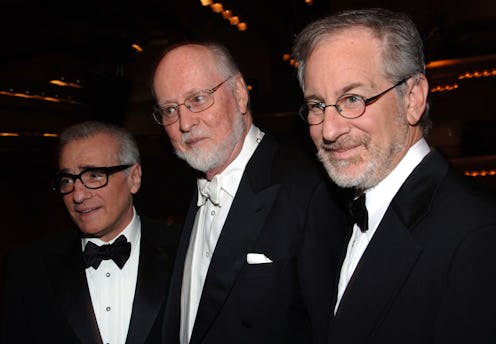Entertainment
John Williams' Lesser Known Spielberg Movie Scores
You hum the bittersweet theme from E.T. any time you take a bike ride, and the ominous reverb from Jaws whenever you go for a swim. Memories of that inimitable Raiders of the Lost Ark number are conjured quite literally at the drop of a hat. And you belt the sweeping Jurassic Park song at any point that you find yourself chased by reanimated prehistoric carnivores. Guess what? You just might be a lover of John Williams. The indomitable film composer has put together some of the most recognizable movie themes in cinematic history, working most famously with fellow big screen giant Steven Spielberg. Once more are the two uniting, this time for Spielberg's developing Cold War thriller (tentatively titled Bridge of Spies ), starring Tom Hanks.
The combination of Spielberg’s directorial prowess and Williams’ aural magnificence has left us championing the stories of alien visitors, shark attacks, melting Nazis, and dino DNA all the more. But relegating the collaborations of Williams and Spielberg to just their blockbusters would be doing a great disservice to the glory espoused by the musical genius in question. Sure, the bigger and grander of Williams’ scores might be the most popular, but we shouldn’t forget about the rest of his great compositions.
Majesty courses through so much of what Williams creates, so let’s afford due appreciation to some of the lesser known of his great contributions to Spielberg’s movies.
Catch Me If You Can
Williams experiments with slithering jazz set the stage for Catch Me If You Can, appropriately concocting a character of mystery, fun, and emphatic aloneness all at once. Leonardo DiCaprio’s attractive yet troubled character owes a good portion of his construction to the score that guides him.
Munich
Williams’ heavy reconfiguration of “Hatikvah,” the Israeli national anthem and song of Jewish empowerment, is one component of his brilliantly moving Munich score. A hearty amalgamation of gravitas and the whimsy of unabashed hope, Williams’ machinations behind the scenes of Munich help to pave an especially affective experience.
The Sugarland Express
Spielberg’s directorial debut, a sleepy crime noir, kicks off its story (and a long history of these two brilliant men working together) with an appropriately soft-spoken harmonica and string number. In the earliest notes, the stage is set for a brooding, ominous mystery yet to come.
War Horse
It’s hard for me to talk about a movie called War Horse with much sincerity. But hey, the music’s good.
The Adventures of Tintin
What besides Williams’ frenetic opening number could paint such a picture of peppy, spirited fun and adventure for a movie so celebratory of both? The youthful vigor of Williams’ theme hardly precludes it from sophistication — perhaps a hint about the unexpectedly wide reach of the animated feature.
Amistad
Williams' orchestration and the accompanying vocals imbue Spielberg's slave ship period piece with an essence of humanity and spirit; the main theme is a piece of music that can draw tears even when played independent from the film.
Hook
The Peter Pan modernization might not have been one of Spielberg’s stronger pieces, but Williams’ score does a bit to boost the film to watchability, inducting into the otherwise lacking story an occasional sense of magic and amazement.
Empire of the Sun
Delivering what might be seen as the most "traditional" work for Spielberg's 1987 World War II film, Williams nonetheless achieves a grandeur conducive to the behemoth themes in this story about a Japanese internment camp.
Lincoln
Forget the Jurassic Park theme — okay, no, don’t, the Jurassic Park theme is awesome, but Williams’ work on Lincoln is nearly as vast, sweeping, and downright exciting. The music courses through the historical drama, lifting it to levels of true adventure and emotional majesty.
Schindler's List
Upon assessing the demands of Spielberg's masterpiece, the 1993 Holocaust film Schindler's List, Williams famously said to the director, "Steven, you need a better composer for this." Spielberg, baffled by this remark, replied, "You're right. But they're all dead." That pretty much says it all.
Images: Getty
